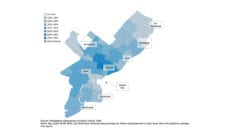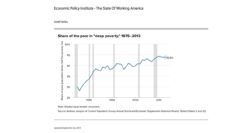Despite decades of research and prevention efforts, Black women experience much worse birth outcomes (e.g., preterm birth, low birthweight) compared to White women. Given that these birth outcomes are the primary cause of infant mortality—and are also linked to worse health during childhood and adulthood—the statistics are ethically troubling and constitute a major public health challenge.
A substantial body of work argues that adverse birth outcomes are primarily the result of psychosocial stress, which is known to operate through multiple biological pathways. These include immune system function and susceptibility to infection, the autonomic nervous system (“fight or flight” response), and coping behaviors such as smoking or drinking.
One way stress can be triggered is by living in a poor neighborhood. For instance, it can be difficult to move up the socioeconomic ladder and make healthy choices when your neighborhood has low quality housing, education, and employment opportunities, feels unsafe, and/or has few nutritious food options.
My colleagues and I tested whether living in poor neighborhoods had an impact on adverse birth outcomes, namely, babies born too early or too small. We also tested whether neighborhood poverty explained the racial disparity in those outcomes, since Black mothers live in poorer neighborhoods compared to White women. We linked approximately half a million birth certificate records to the 5,000 neighborhoods in Texas according to mothers’ home addresses to answer these questions.
Policies that either address neighborhood poverty or mitigate its effects are warranted to improve the health of mothers and prevent adverse birth outcomes.
We found mixed results. Neighborhood poverty was indeed associated with adverse birth outcomes in Texas. For example, mothers who lived in a neighborhood with long-term high poverty, measured over 20 years using census data, had nearly a 20% higher chance of having a preterm birth baby compared with mothers who lived in long-term low poverty neighborhoods. And this was after accounting for their own characteristics, such as age and education. We also found that mothers living in neighborhoods that experienced change in poverty rates over time (either increasing or decreasing) also had a higher chance of having a baby too soon or too small.
Surprisingly, however, these neighborhood poverty conditions did not appear to explain the racial disparities. Black women still had a significantly higher chance of having babies too early and too small even after we accounted for personal and neighborhood characteristics. Other unmeasured factors that we did not have access to, such as wealth or discrimination, may possibly explain the difference.
Understanding how past and present policies influence neighborhood economic conditions provides a possible path to mitigating adverse birth outcomes. The long-term economic impact of intentional segregation by race and class created advantaged and disadvantaged neighborhoods that systematically differ in resources, services, and social environments that are important for health. As a result, people living in wealthy neighborhoods benefit from resources, political power, and opportunities for upward mobility, while low-income neighborhoods are relatively lacking in such things.
Policies that either address neighborhood poverty or mitigate its effects are warranted to improve the health of mothers and prevent adverse birth outcomes. Policies can be implemented at the neighborhood level (i.e., improving parks, policing, access to healthy foods, social connection among neighbors), municipal level (i.e., increasing affordable housing and funding for early childhood education and public schools), and the state level (i.e., expanding Medicaid access and mental health services, passing a minimum wage increase, rent control).
These policies, among others, have the potential benefit of improving many health outcomes for the entire population, in addition to birth outcomes.
Photo by Ross Joyner on Unsplash














